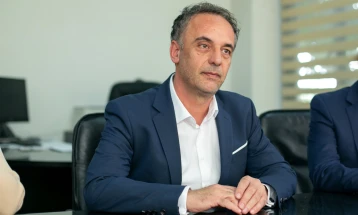James O'Brien: U.S. to be very active in Skopje - Sofia dialogue once Bulgaria forms stable gov't
- The United States is expected to be very active in the talks about the exact way the Skopje – Sofia agreement is implemented as soon as a more stable government is formed in Bulgaria, James O’Brien, U.S. Assistant Secretary of State for European and Eurasian affairs, has said.

Skopje, 31 July 2024 (MIA) – The United States is expected to be very active in the talks about the exact way the Skopje – Sofia agreement is implemented as soon as a more stable government is formed in Bulgaria, James O’Brien, U.S. Assistant Secretary of State for European and Eurasian affairs, has said.
Speaking at a hearing at the US Senate Committee on Foreign Relations on the future of Europe, O’Brien said North Macedonia has suffered because of disagreements with its neighbors which changes the accession requirements for it constantly.
He was asked by U.S. Senator Jeanne Shaheen of New Hampshire what the U.S. could do more to encourage the Europeans to do good on their promises to the Western Balkans countries that have met the required reforms without changing the rules or conditions for their accession into the EU, which is the case with North Macedonia.
“The main issue is the agreement North Macedonia has with Bulgaria and as soon as Bulgaria has a more stable government, there should be talks about the exact way it should be implemented. It’ll be an area in which I expect us to be very active,” responded O’Brien.
Bulgaria has said it will not set new conditions on the EU integration path, pledging, however, it won’t allow deviation from the agreements, including the inclusion of Bulgarians into the Macedonian constitution.
PM Hristijan Mickoski has insisted he will not negotiate under dictates and ultimatums calling on Bulgaria to respect the rights of the Macedonian community there after the European Court of Human Rights handed down 14 judgements acknowledging their rights were breached in Bulgaria.
The United States have been working on maintaining the agreement with Greece, too, said O’Brien.
“Part of our work diplomatically is to prepare a path so that North Macedonia maintains the agreement it has with Greece,” he said, adding that Washington’s goal is to ensure that “Greece becomes a friend of North Macedonia’s path forward rather than a critic. The same with Albania,” he added.
Mickoski and President Gordana Siljanovska – Davkova has said they will use the constitutional name of the country in official context and the name Macedonia in their statements as an act of personal right to self-determination and self-identification.
Greek PM Kyriakos Mitsotakis at the NATO Summit in Washington in early July said that one of the key aspects of the Prespa Agreement is the name North Macedonia to be used erga omnes – both in the country and internationally. He has said his country “will not reveal the weapon it has at disposal to respond to the tactics of the leadership in the neighbouring country.”
U.S. Ambassador Angela Aggeler has stated that the agreements with Greece and Bulgaria will not be renegotiated.
“These agreements are concluded. There is no renegotiation of Prespa [Agreement], there is no renegotiation for the accession into the EU. It is very clear,” said Aggeler in an interview with Radio Free Europe in June.
MIA file photo







